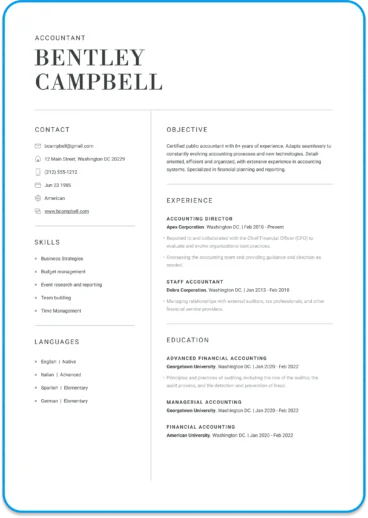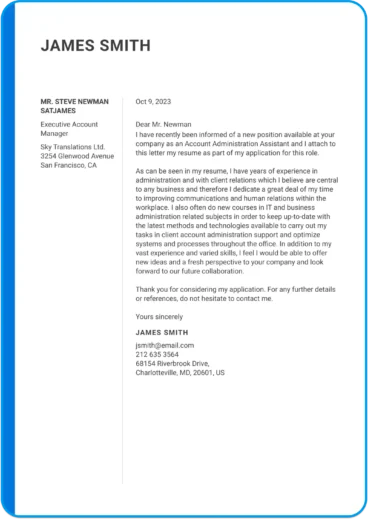Resume Templates
Resume samples

Create and edit your resume online
Generate compelling resumes with our AI resume builder and secure employment quickly.
Write a cover letter

Take a look at our cover letter guides and examples, to help you write a cover letter that complement your resume and enhace your applications.
Cover Letter Examples
Cover Letter Samples

Create and edit your cover letter
Use our user-friendly tool to create the perfect cover letter.
Featured articles
- How to Write a Motivation Letter With Examples
- How to Write a Resume in 2024 That Gets Results
- Teamwork Skills on Your Resume: List and Examples
- What Are the Best Colors for Your Resume?
Latests articles
- Flexible and Rewarding Jobs for Moms: 2025’s Top Picks
- Mastering LinkedIn Skills – Tips, Tricks, and Best Practices
- How To Survive Background Checks by Employers
- Best Online Jobs for Teens in 2025

Dive Into Expert Guides to Enhance your Resume

Adding Interpersonal Skills to Your Resume

Over the past few years, more hiring managers and senior leaders have realized the importance of hiring individuals with strong interpersonal skills. These skills boost collaboration, encourage teamwork, and build positive work cultures.
To help you prepare for embracing this shift, we’re going to show you how to add interpersonal skills to your resume.
When employers are asked about what they look for in ideal candidates, they’ll often bring up communication, teamwork skills , and adaptability. These skills are the unsung heroes in the professional world because they directly impact your ability to connect with and influence others.
Whether you’re aiming to impress in finance or charm in customer service, possessing strong interpersonal skills is key to building effective relationships with everyone from colleagues to clients.
Skills-based hiring is on the rise. This means that although formal education is beneficial, it is no longer the top priority for many organizations. According to a recent study by LinkedIn, Skills-based hiring on the rise employers are beginning to reimagine what the workplace looks like for the future.
Before you even get a chance to dazzle in an interview, your resume needs to speak volumes about your interpersonal abilities. It’s your first handshake with the employer, your first opportunity to showcase how you excel in communication and collaboration.
As you tailor your resume for each job application, it’s vital to decode the job posting . Identify the specific interpersonal skills each employer is hunting for – they’re often the puzzle pieces to completing your application picture.
Looking for a fast way to improve the interpersonal skills on your resume? Try our AI-powered resume builder and get personalized on-the-go suggestions.
Valuable Interpersonal Skills to List on Your Resume
Many professions require similar interpersonal skills. At the end of the day employers want to employ professionals who can get along with, inspire, and motivate other team members. This is because these interpersonal skills impact the outcomes of business goals. Teams who work together well often produce high-quality work, are extremely efficient, and satisfied with their job overall (boosting retention). The importance of interpersonal skills should not be underestimated.
If you’re wondering what interpersonal skills you can include on your resume , we’ve listed some below to help get you started. Let’s start with some of the most important interpersonal skills employers look for :
- Adaptability
In today’s fast-paced work environments, employers value candidates who can quickly adjust to changing priorities, embrace new technologies , and navigate unexpected challenges with resilience and flexibility. In order for companies to stay ahead and remain competitive, they need professionals on their team who can embrace change with a positive attitude and forward-thinking approach.
Empathy and Emotional Intelligence
Understanding and sympathizing with others is important for any job that involves working with people. For professions such as teachers, customer service workers , nurses, and doctors, it is essential. Beyond this, everyone wants colleagues who can empathize and on top of empathizing with others, it’s important for professionals to be able to navigate and manage their own emotions.
Teamwork and Collaboration
This is one of the most important interpersonal skills in the workplace as many jobs involve working as a team. It’s crucial to demonstrate to prospective employers that you’re a team player who can work effectively with others to reach common goals. This also fosters a positive work environment and enhances productivity.
Conflict Resolution
With diverse workplaces, it’s essential that candidates are able to resolve conflicts diplomatically and constructively. Leaders appreciate those who can address and handle disagreements and misunderstandings professionally and with grace, which contributes to a collaborative and peaceful work environment.
Transparency
Honest communication is highly valued by employers. Work often involves problem-solving and constructive criticism . It is important to be able to talk openly about success and failure without hiding things and feeling uncomfortable. Transparency also is the key to building trust among colleagues.
Negotiation skills
Strong negotiation skills are essential for sales jobs or any positions that involve making deals. Make sure you include this on your resume if it’s a requirement for the job you’re applying for.
Leadership and Influence
All businesses need leaders, and great ones are rare. Leadership skills are particularly important for managers as well as teachers, recruiters, lawyers, and project managers. Even if a role isn’t classified as “managerial”, demonstrating leadership qualities such as initiative and problem-solving can help set you apart.
Public Speaking
Speaking in front of audiences is difficult for many people which is why it is such a valuable skill. If giving presentations or training sessions is a job requirement, showcase your speaking skills on your resume. You can include keynotes, presentations , or trainings that you’ve led. Also, use the job interview as a chance to shine and showcase your speaking skills.
Interpersonal Skills List
Here is a list of other good interpersonal skills for your resume:
- Active listening
- Assertiveness
- Conflict management
- Constructive criticism
- Cultural awareness
- Customer service
- Decision-making
- Diplomacy
- Emotional intelligence
- Empathy
- Encouraging
- Flexibility
- Giving instructions
- Interviewing
- Mediating
- Negotiation
- Nonverbal communication
- Problem-solving
- Rapport building
- Reliability
- Sensitivity
- Social perceptiveness
- Team collaboration
- Time management.
- Trust building

Key Industries Where Interpersonal Skills Shine
The skills we have been discussing in this article are the currency of success. They open doors, build bridges, and create connections.
Let’s take a quick tour through the sectors where interpersonal skills are not just an asset but the backbone of every interaction:
- Healthcare : It’s not just about medical know-how; it’s about heart-to-heart connections. Empathy and clear communication are the lifeblood of this sector.
- Education : Here, interpersonal skills don’t just teach; they transform. Educators need these skills to connect, inspire, and shape the futures of their students.
- Sales and marketing : This is where persuasive prowess meets relationship wizardry. Connecting with customers and understanding their needs is the name of the game.
- Customer service and Hospitality : The front line of business, where patience and problem-solving turn challenges into cheers.
- Human resources : The art of balancing business brains with emotional intelligence. HR pros are the matchmakers of the corporate world.
- Hospitality and tourism : Creating memorable experiences is all about service with a smile and a skillful conversation.
- Law and public relations : Where words wield power, and negotiation is king. It’s all about making a case and maintaining a reputation.
- Social Work and Counseling : Empathy, active listening, and conflict resolution are essential for building relationships that facilitate positive outcomes.
In these industries, interpersonal skills are not merely a component of the job, they are f undamental to professional success and effectiveness. Sharpening these skills can turn opportunities into achievements and careers into legacies.
How to Include Personal Skills on Your Resume
It’s important to make references to your interpersonal skills on your resume . However, simply saying that you have strong people skills on your resume isn’t enough. Each interpersonal skill should be demonstrated by using evidence.
Using anecdotes, figures, and results is much more convincing than simply stating “strong leadership skills” or “good at public speaking”.
Instead, you can say “led a team of 12 people and increased sales by 15%” or “gave numerous presentations to audiences of over 50 people”. Try to focus on what your skills helped you achieve .
There is no need to mention all of your interpersonal skills as many are linked. For example, if you can demonstrate you have strong negotiation skills it also shows that you’re a good listener, a confident speaker, and can read other people.
Where to Include Interpersonal Skills on Your Resume
The two most natural sections to reference your interpersonal skills are your professional experience section and your skills section. You can include references in either one or both sections.
Be ready to answer questions about your interpersonal skills in the job interview . Prepare further examples of when you’ve demonstrated your communication skills, other than the interpersonal skills examples you’ve already added to your resume.
Another section you can add interpersonal skills is in your branding statement section, which is at the very top of your resume. You can also provide examples with bullet points to back up your statement.
An example for a social work professional:
Compassionate and solution-focused social work graduate primed to build an impactful career in social services. Natural advocate dedicated to bridging communication gaps, increasing access to resources, and providing safe spaces for clients throughout Michigan.
- Engaging facilitator with 5+ years’ combined experience leading social emotional workshops and group interventions for parents and teens.
- Proactive problem solver committed to empowering individuals by providing the tools and programs they need to thrive.
- Passionate changemaker adept at creating respectful, welcoming, and collaborative environments.
This example showcases several interpersonal skills while providing proof and results .
5 Strategies to Enhance Your Interpersonal Skills
Wondering how you could improve your interpersonal skills? Let’s dive into some cool, practical ways to boost these skills , making sure you’re ready to ace any conversation, meeting, or team huddle that comes your way.
Be intentional about building connections
In today’s remote work era, proactively seek groups that align with your professional or personal passions. Whether it’s a virtual networking event or a local hobby group, these environments are the ideal ground for practicing and enhancing interpersonal skills.
Reflect and look for areas to improve
Post-interaction reflections can be enlightening. Consider the nuances of your exchanges – the words chosen, the reactions given, and the non-verbal cues expressed. Each interaction is an opportunity for refinement.
Also, don’t be afraid to seek feedback from those you interact with. You can ask them for advice on ways to improve your communication, networking, and interactions. Friends and colleagues can offer invaluable insights into your interpersonal style, providing a fresh lens through which to view and improve your skills.
Seek guidance from mentors
Mentorship can be a guiding light in your journey to interpersonal excellence. A mentor who embodies the skills you aspire to can offer tailored advice and real-world wisdom.
Set realistic and targeted goals
Chart your progress with clear, achievable goals. Setting specific objectives in your interpersonal development journey can provide direction and a sense of accomplishment as you witness your growth.
Ask a friend to join you on this journey and see if they are willing to be your accountability buddy. Having someone to bounce ideas off of and share your success with can motivate you!
So, there you have it – a toolkit for interpersonal success that’s as dynamic as the conversations you’ll find yourself in. Remember, it’s all about practice, feedback, and a bit of fine-tuning.
Keep these strategies in your back pocket, and watch as your interpersonal skills sharpen, making every interaction not just a chat, but a chance to shine.
Interpersonal Skills FAQs
Dive into our Interpersonal Skills FAQs, where we unravel common queries to help you navigate and enhance this crucial aspect of your professional toolkit.
Good interpersonal skills encompasses a range of abilities that make effective and positive interactions with others possible. Good interpersonal skills are also ones that come naturally to you and allow you to thrive in and outside of the workplace. Colleagues, friends, and family members can often tell us what they believe our good interpersonal skills are. Outside of the skills you naturally possess, key interpersonal skills examples include effective communication , which involves both clear expression and active listening. Empathy , the ability to understand and share the feelings of others, is crucial, as is teamwork, demonstrating the ability to collaborate and contribute constructively in group settings. Conflict resolution skills, essential for handling disagreements positively, and adaptability , showing flexibility in various situations, are also vital. Additionally, strong interpersonal skills include leadership and the ability to motivate and inspire others, alongside patience and a respectful attitude toward diverse perspectives.
In the workplace, interpersonal skills are the abilities that enable an individual to interact effectively and harmoniously with colleagues, clients, and management . These skills encompass clear and empathetic communication, teamwork, and the capacity to build and maintain professional relationships. They also include conflict resolution, adaptability to different personalities and situations, and the ability to give and receive constructive feedback. Essentially, interpersonal skills in the workplace are about understanding and navigating the social dynamics of a professional environment , ensuring collaborative success and a positive and productive work culture.
Interpersonal skills are vital in the workplace as they foster effective communication, collaboration, and a positive work culture, which is essential for achieving organizational goals . These skills enable employees to build strong relationships, resolve conflicts amicably, and create an innovative and creative work environment. They enhance teamwork, ensuring diverse groups work cohesively towards common objectives. Good interpersonal skills in the workplace also aid in understanding and meeting client needs , leading to better customer satisfaction and business success. Furthermore, they are crucial for leadership , as they help in motivating and guiding teams and managing change effectively, thereby driving the overall growth and productivity of the organization. Interpersonal skills are at the core of personal and professional well-being and satisfaction. Possessing these skills allows you to stand out in a competitive job market and make a lasting impact are your current company. Now that you know the benefits of showcasing interpersonal skills, make sure to highlight them on your resume because your future employer is looking for the skills you possess!

Struggling with Resume Writing?
Ease the process with our templates
Related Posts


IMAGES
VIDEO